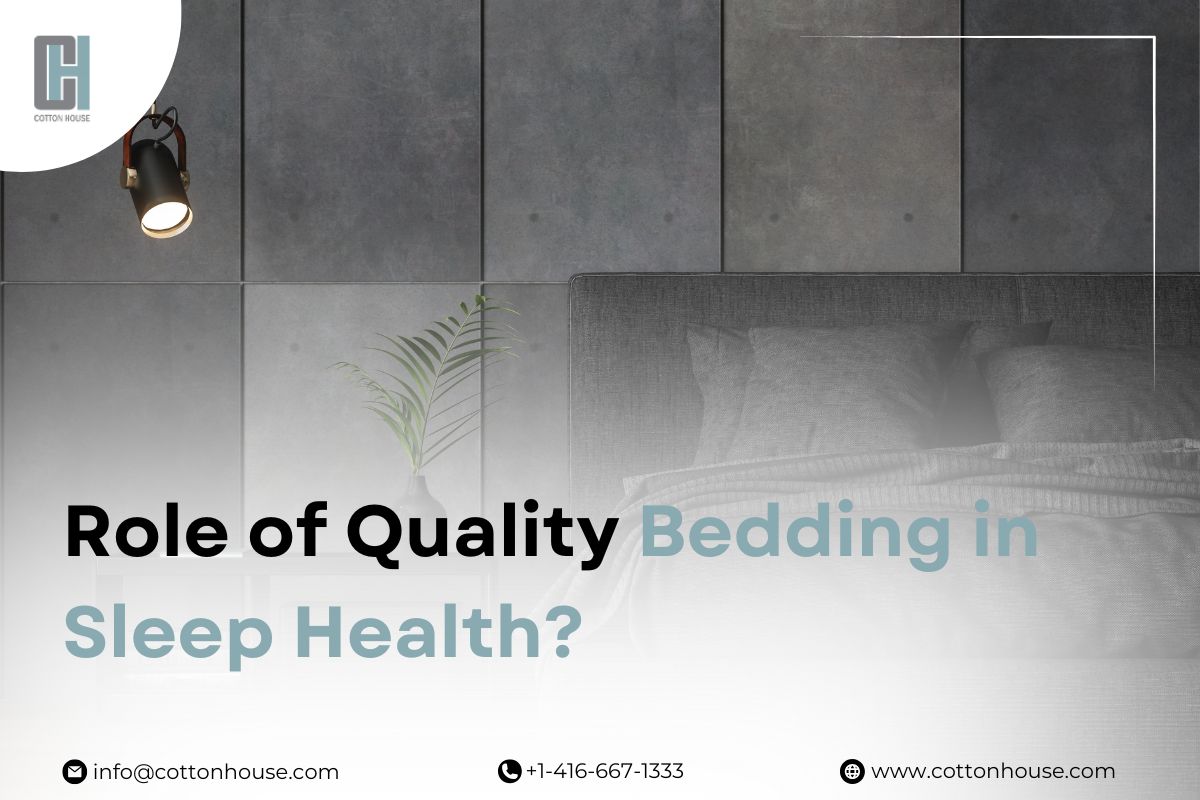
A good night’s sleep is one of the most important pillars of a healthy lifestyle, yet many people overlook a crucial factor that impacts it daily—your bedding. While mattresses and pillows often get attention, the role of quality bedding in sleep health is just as vital. From regulating temperature to reducing skin irritation, your sheets, blankets, and pillowcases do far more than just decorate your bed.
Let’s explore how quality bedding supports better sleep, why it matters, and what to look for when choosing the right fabric for your personal needs.
Why Sleep Health Should Be a Priority?
Sleep is not a luxury—it’s a biological necessity. According to the CDC, adults need at least 7 hours of quality sleep each night to maintain optimal health. Chronic sleep deprivation has been linked to issues such as obesity, heart disease, diabetes, and depression.
But it’s not just about how long you sleep. It’s about how well you sleep. Your environment, especially your bedding, plays a key role in creating conditions for uninterrupted, restorative rest. That’s why understanding the importance of bedding in sleep routines is essential for everyone.
Also Read: Why You Should Use Bamboo Pillows: A Smart Choice for Better Sleep?
What Defines “Quality Bedding”?
Not all bedding is created equal. Quality bedding is more than just high thread count or luxury branding—it’s about material, breathability, comfort, durability, and hypoallergenic properties.
Here’s what defines premium-quality bedding:
- Fabric: Natural fabrics like cotton, bamboo, and linen are often preferred for their breathability and softness.
- Weave and Thread Count: A balanced thread count (typically 300–600 for cotton) ensures comfort without overheating.
- Temperature Control: High-quality bedding can help regulate your body temperature, making it perfect for both summer and winter.
- Sensitive Skin-Friendly: The best fabric for sensitive skin sleep includes organic cotton and bamboo as they’re gentle and free from harsh chemicals.
When you invest in such bedding, you’re not just improving comfort—you’re enhancing your sleep quality and overall wellness.
How Bedding Impacts Sleep Quality?
Comfort & Pressure Relief:
Tossing and turning at night? Your bedding might be the culprit. Soft, supportive bedding minimizes friction on your body, which reduces movement and helps you fall asleep faster. When your body feels comfortable, your mind relaxes, making it easier to transition into deeper stages of sleep.
Temperature Regulation:
Ever wake up sweaty in the middle of the night? That’s likely due to poor temperature control. Breathable bed sheets for night sweats can make a huge difference. Natural materials like bamboo and percale cotton allow better airflow and moisture-wicking, keeping your body at a balanced temperature throughout the night.
Allergy Control and Hygiene:
Dust mites and allergens thrive in low-quality, unwashed bedding. But high-quality, hypoallergenic bedding can prevent allergens from building up, especially if you choose materials that are antimicrobial and easy to wash. This is critical for individuals with asthma, allergies, or skin sensitivities. Again, using the best fabric for sensitive skin sleep can reduce irritation and improve sleep quality.
Also Read: The Best Comforter Materials for Allergy Sufferers
Choosing the Right Bedding for Your Needs:
Selecting the right bedding isn’t one-size-fits-all. It depends on your personal preferences, skin type, and sleeping habits.
Here’s a quick guide to help:
| Need | Best Bedding Type |
| Hot sleeper | Breathable bed sheets for night sweats like bamboo or Tencel |
| Cold sleeper | Flannel or heavyweight cotton |
| Sensitive skin | Best fabric for sensitive skin sleep such as organic cotton or silk |
| Allergies | Hypoallergenic microfiber or organic materials |
The benefits of quality bedding become clear when you match your sleep conditions with the right materials. It not only enhances sleep but also improves your skin health and daily energy levels.
Common Mistakes People Make with Bedding:
Even the best sheets can fall short if they’re not used correctly. Here are a few mistakes to avoid:
- Holding onto old bedding for too long: Worn-out sheets lose their structure and hygiene.
- Neglecting wash frequency: Sheets should be washed every 1–2 weeks to maintain freshness and prevent skin issues.
- Ignoring seasonal needs: Use lighter, breathable options in summer and warmer, insulating ones in winter.
- Choosing style over comfort: That shiny polyester set might look good—but it can overheat or irritate sensitive skin.
These small errors can add up, negatively impacting your sleep over time. So, can bedding affect sleep quality? Absolutely.
Final Thoughts: Investing in Better Sleep Starts with Better Bedding
The role of quality bedding in sleep health is often underestimated. But if you think about how much time we spend in bed—roughly one-third of our lives—then investing in the right sheets, comforters, and pillows is not just about luxury; it’s about self-care.
From breathable bed sheets for night sweats to the best fabric for sensitive skin sleep, making informed choices can result in deeper rest, reduced health risks, and more productive days.
So next time you’re upgrading your bedroom, don’t just focus on aesthetics. Remember: the benefits of quality bedding extend well beyond looks—it’s a gateway to better sleep, improved mood, and long-term wellness.
FAQs
Q1: Can bedding affect sleep quality?
Yes, it can. The wrong bedding may cause overheating, skin irritation, or lack of comfort—all of which disrupt sleep cycles. Choosing breathable and hypoallergenic materials enhances rest.
Q2: What is the best fabric for sensitive skin sleep?
Organic cotton, bamboo, and silk are top choices. They are gentle, chemical-free, and allow skin to breathe, making them ideal for people with allergies or skin conditions.
Q3: How often should I change or replace my bedding?
Sheets should be washed every 1–2 weeks. Replace pillows every 1-2 years and sheets every 18–24 months depending on wear and tear.
Q4: Are breathable bed sheets for night sweats really effective?
Absolutely. Fabrics like bamboo and Tencel wick moisture away and promote airflow, helping reduce nighttime sweating and discomfort.



